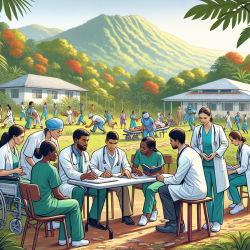In the world of special education and therapeutic services, understanding the intricate needs of patients is paramount. A recent case study titled "It Takes a Village: The Importance of Neuropsychological Findings in a Collaborative Approach for a Patient with Congenital Central Hypoventilation Syndrome and Specific Phobia" sheds light on how neuropsychological evaluations can significantly enhance treatment strategies for complex conditions like Congenital Central Hypoventilation Syndrome (CCHS).
The Case at a Glance
The study focuses on a 26-year-old male diagnosed with CCHS and specific phobia related to medical procedures involving anesthesia. This patient, referred to as Mr. A, had developed a fear of anesthesia despite having undergone numerous bronchoscopies in the past. His condition was further complicated by neurocognitive deficits that impacted his ability to engage in psychiatric and psychosocial treatment.
The treatment approach involved neuropsychological testing, medication consultation, and cognitive-behavioral psychotherapy. The collaborative effort among clinicians, family members, and nursing staff proved crucial in addressing Mr. A's complex needs.
The Role of Neuropsychological Evaluation
The case highlights the importance of neuropsychological evaluation in understanding a patient's cognitive functioning and directing treatment approaches. For practitioners, incorporating neuropsychological insights can:
- Identify Cognitive Deficits: Neuropsychological testing can reveal cognitive deficits that may not be apparent through standard assessments. These insights allow practitioners to tailor interventions more effectively.
- Guide Treatment Strategies: Understanding the cognitive profile of patients like Mr. A helps in designing targeted therapies that address specific challenges such as attention deficits or executive dysfunction.
- Facilitate Collaborative Care: Sharing neuropsychological findings with all members of the care team ensures a unified approach to treatment, enhancing overall patient outcomes.
Encouraging Further Research
This case underscores the need for further research into the neurocognitive aspects of CCHS and similar conditions. Practitioners are encouraged to delve deeper into existing literature and contribute to expanding our understanding of these complex disorders.
Conclusion
The integration of neuropsychological evaluations into treatment plans offers valuable insights that can significantly improve patient care. By fostering collaboration among healthcare providers and leveraging detailed cognitive assessments, practitioners can enhance their skills and provide better outcomes for patients with complex conditions like CCHS.
This case serves as an inspiration for practitioners to adopt a holistic approach in their practice, emphasizing the importance of comprehensive evaluations and collaborative care models.










